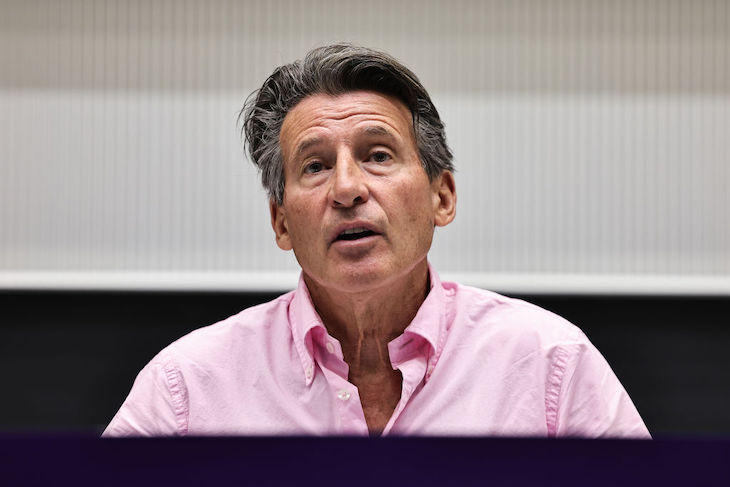World Athletics has decided to protect women’s sport by restricting it to females. From 31 March, transwomen will not be allowed to compete in elite female competitions if they have gone through male puberty. Following yesterday’s meeting of the World Athletics Council, Seb Coe – the governing body’s president – explained that the decision was ‘guided by the overarching principle which is to protect the female category’.
That decision should be welcomed by everyone, but why did it take them so long? Swimming’s world governing body came to the same conclusion last summer; world rugby got there in 2020. Athletics, meanwhile, dithered and fiddled with rules based on the level of testosterone in an athlete’s blood. Should the cut-off be set at ten nanomoles per litre, or should it be just five? Recently, two and a half was mooted. These appeared to be little more than arbitrary lines, set at a level somewhere between the typical male and the typical female.
Has this truth registered with Stonewall?
But men and women are, of course, not defined by the hormones in their blood. Men can have low testosterone for a host of different reasons. Those being treated for prostate cancer – a condition that can be aggravated by testosterone – may be prescribed drugs to shut off the production of testosterone, for example. Nobody, however, is suggesting that those men be allowed to compete with women to somehow compensate for any loss of competitive edge.
In a nutshell, the argument made by some is effectively that if someone feels they are a woman then they should be able to compete against women. It might be nonsense, but so is the oft-chanted slogan, ‘transwomen are women’. The simple truth is that transwomen are male and therefore should compete against other males.
But has this truth registered with Stonewall? Last night the ‘lesbian, gay, bi, trans, queer, questioning and ace’ (asexual) organisation expressed its disappointment, deploring World Athletics’ ‘unilateral ban on trans women in track and field events’. Let’s be clear, nobody has been banned from athletics – unilaterally or otherwise – because of yesterday’s decision. Rather, transwomen must now compete against their own sex and rightly so. Whatever our blood testosterone, we continue to enjoy male advantage over females. I should know; I am one.
The idea of me competing in any sporting disciple would be risible to anyone who knows me. But whatever a person’s sporting ability, the same principle should apply at every level, not just at World Championships and the sort of competitions where world records are set. When my wife and I shift furniture in the house, I still take the heavy end – every time. My blood testosterone is below every cut-off that governing bodies have suggested, but my skeleton, muscles, heart volume and lung capacity are still typically-male. Should I join the local park run and stagger my way around the 5 km course, I would register as male. I still get to run in exactly the same way alongside exactly the same people. But even towards the back of the field, I retain an advantage over women of the same age and level of fitness. It would be wrong and unfair for me to put them one place further back in their own sex category.
Ideally, Coe’s announcement would have applied equally at all levels, right down to the grass roots, but sport doesn’t work like that. Park Run had previously made it clear that they categorise people ‘based on gender rather than assigned sex’. The organisation felt that this approach allowed competitors to ‘identify in the way they feel most appropriate and comfortable’. Park Run is making a mistake here: comfort should not excuse unfairness. But World Athletics’ remit – and its sensible rules – only goes so far. But Coe’s statement appears to already be having a positive effect in encouraging others to speak out. Last night it was good to see the English Schools Athletics Association defend the rights of schoolgirls. In a statement, the ESSA explained that the girls category is for those ‘who were recorded female at birth.’
While Coe’s comments are welcomed, this is, of course, far from a settled debate. A more pertinent challenge to World Athletics would be over their decision to apply different rules to male athletes who had not gone through male puberty. Taking the statement at face value, those competitors could still be eligible for the elite female category. Why? The organisation might not expect too many cases, but international athletics takes place in a political arena where governments compete for national glory. Puberty is not a one-off event that happens overnight; it takes place gradually over several years. Will there be a cut-off point and, if there is, who decides? Repressive regimes may well spot a loophole that can be exploited and be tempted to follow the example of East Germany. Then it was girls who were abused; now at potential risk are pre-pubescent boys with exceptional prospects in track and field.
Questions also need to be asked about the working group that World Athletics has set up to ‘further consider the issue of transgender inclusion’. Its remit will be to consult ‘specifically with transgender athletes to seek their views on competing in athletics; to review and/or commission additional research where there is currently limited research.’ But no new research is needed to show that sex matters in sport; what they might do with their time is to also consult specifically with female athletes. They are, after all, again discussing the category that women once thought was their own.







Comments